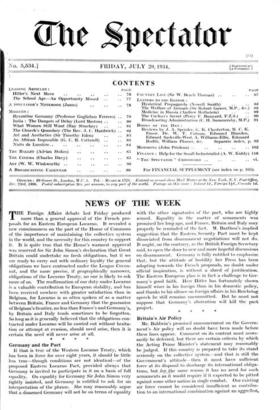Germany and the Pact If that is true of the
Western Locarno Treaty, which has been in force for over eight years, it should be little less true—though conditions are not identical—of the proposed Eastern Locarno Pact, provided always that Germany is invited to participate in it on a basis of full equality. On equality for Germany Sir John Simon very rightly insisted, and Germany is entitled to ask for an interpretation of the phrase. She may reasonably argue that a disarmed Germany will not be on terms of equality with the other signatories of the pact, who are highly armed. Equality in the matter of armaments was promised her long ago, and France, Britain and Italy may properly be reminded of the fact. M. Barthou's implied suggestion that the Eastern Security Pact must be kept dissociated from disarmament negotiations will not do. It ought, on the contrary, as the British Foreign Secretary said, to open the door to new and more hopeful discussions on disarmament. Germany is fully entitled to emphasize that, but the attitude of hostility her Press has been adopting towards the French proposals, no doubt under official inspiration, is without a shred of justification. The Eastern European plan is in fact a challenge to Ger- many's good faith. Herr Hitler has fortunately shown himself wiser in his foreign than in his domestic policy, and thanks to his silence on foreign affairs in his Reichstag speech he still remains uncommitted. But he must not suppose that Germany's abstention will kill the pact project. * *














































